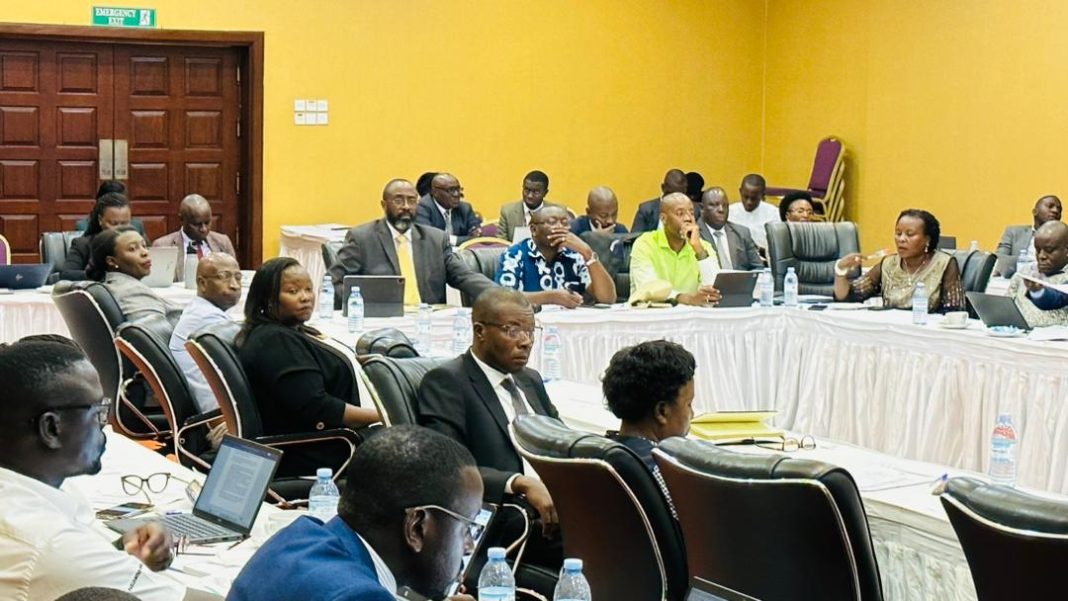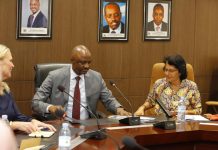A vibrant atmosphere fills Speke Resort Munyonyo as a three-day induction retreat for Members of Parliament on the Environment and Natural Resources Committee takes centre stage. This retreat is dedicated to providing vital updates on the progress of activities led by the Ministry of Energy and Mineral Development.
A diverse array of participants have gathered, representing entities such as the Parliament of Uganda, the Ministry of Energy and Mineral Development, the Petroleum Authority of Uganda (PAU), the Electricity Regulatory Authority (ERA), and other key players within Uganda’s energy sector. This inclusive induction session underscores a shared commitment to fostering a unified approach to environmental stewardship and resource management.
The workshop opened with engaging insights from Dr Emmanuel Otiam Otaala, the Committee Chairperson. Dr Otaala shed light on the committee’s evolution and stressed the seamless integration of new members. He emphasised the sector’s pivotal role in propelling economic transformation and elevating Uganda’s status to that of a middle-income nation. The session resounded with a call for unity and collaboration between the committee and the sector.

Dr Ruth Nankabirwa Ssentamu, Minister of Energy and Mineral Development, congratulated the new committee members, acknowledging the importance of a robust working relationship between the committee and the executive branch. The minister’s focus on orientation and technical competence underscored the commitment to effective governance and the sustainable management of resources.

Ms Irene Pauline Bateebe, the Permanent Secretary of MEMD, presented a comprehensive overview of the ministry’s organisational structure. She elucidated the functions of various departments, including Energy Efficiency and Conservation, Nuclear Energy, Electric Power, Renewable Energy, Rural Electrification, Petroleum Exploration, Midstream Petroleum, Petroleum Supply, Mines, Geological Survey, Geothermal Resources, Finance and Administration, as well as Sector Planning and Policy Analysis.

Participants gained insight into the ministry’s role in sustainable development and exploiting energy and mineral resources. The session highlighted the collaboration of ten agencies with MEMD to regulate and implement various programs and activities.
Delving into Uganda’s energy landscape, the workshop introduced new initiatives in electricity, oil, and minerals management, emphasising the nation’s commitment to growth and sustainability.
The workshop facilitated an understanding of the organisational structure of the Ministry of Energy and Mineral Development. Participants grasped the contributions of different departments to sustainable development, revealing the intricate collaboration required for effective governance.
The Petroleum Session, chaired by PAU Board Member Mr Adrian Bukenya, offered a deep dive into the petroleum sector—presentations by key figures such as Mr Honey Malinga and Ernest N.T. Rubondo unveiled the policy, legal, and regulatory framework underpinning Uganda’s petroleum program. The sector’s dynamics were comprehensively explored, focusing on upstream activities, exploration, and commercialisation.
Insights from Mr Philips Obita, representing the Uganda National Oil Company (UNOC), further enriched the dynamic engagement. His overview of oil and gas projects illuminated UNOC’s role as an investor along the petroleum value chain, highlighting the importance of commercial partnerships for sustainable growth.
The Ministers of State: Peter Lokeris (Mineral Development) and Okaasai S. Opolot (Energy), are in attendance.
As the workshop continues, attendees eagerly absorb knowledge and cultivate connections that will empower them to guide Uganda’s energy and natural resources toward a prosperous and sustainable future.























